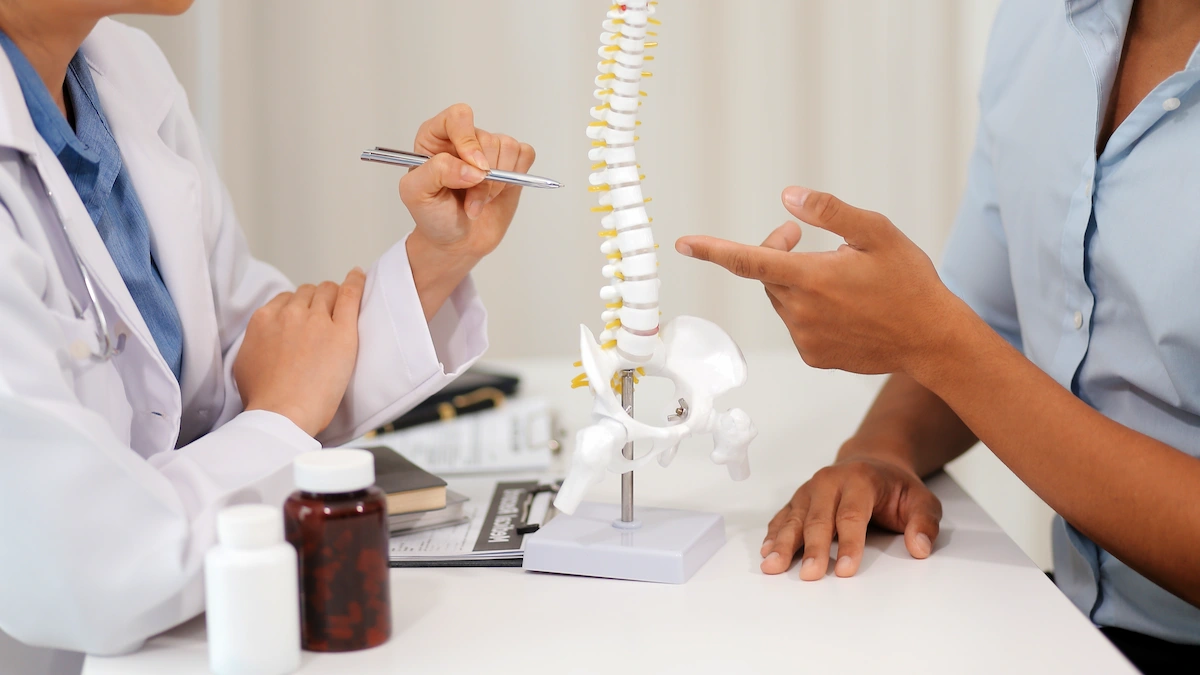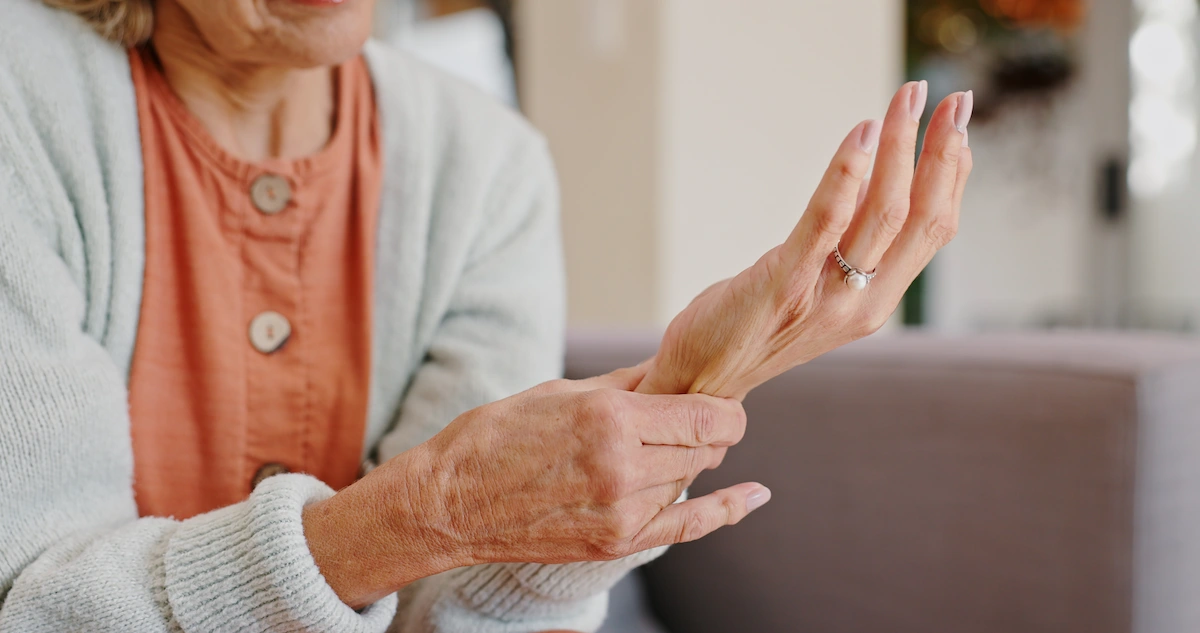Is Osteoporosis Genetic? Understanding Bone Health and Heredity

Osteoporosis, a condition that weakens bones and increases the risk of fractures, is a common concern, especially for aging individuals. But to what extent do your genes play a role in this disease?
If you’re in Miami and wondering, “Is osteoporosis genetic?”, this article will provide a comprehensive understanding of the connection between genetics and bone health. We’ll explore the risk factors, symptoms, and preventive measures, empowering you to take proactive steps towards maintaining strong bones.
Is Osteoporosis Genetic? Unraveling the Role of Heredity
While lifestyle factors significantly influence bone health, genetics do play a role in determining your risk of developing osteoporosis.
- Family History: If you have a family history of osteoporosis, particularly in your parents or siblings, your risk of developing the condition increases.
- Gene Variations: Specific genes influence bone mineral density, calcium absorption, and other factors related to bone health. Variations in these genes can increase your susceptibility to osteoporosis.
Is Osteoporosis Hereditary? The Nature vs. Nurture Debate
While osteoporosis can be hereditary, it’s not solely determined by your genes. Lifestyle factors also play a crucial role. This means that even if you have a genetic predisposition to osteoporosis, you can take steps to mitigate your risk and maintain strong bones.
Osteoporosis vs. Arthritis: Distinguishing Between Joint Conditions
Osteoporosis and arthritis are often confused, but they are distinct conditions:
- Osteoporosis: A disease that weakens bones, making them fragile and prone to fractures.
- Arthritis: Inflammation of the joints, causing pain, stiffness, and reduced mobility.
While both conditions can affect your musculoskeletal system, they have different causes and treatment approaches.
Osteoporosis in Men: Not Just a Woman’s Disease
While osteoporosis is more common in women, men can also develop the condition, especially as they age. It’s crucial for men in Miami to be aware of their bone health and seek medical advice if they experience any symptoms or risk factors.

Symptoms of Osteoporosis: Recognizing the Signs
Osteoporosis often doesn’t cause noticeable symptoms in its early stages. However, as it progresses, you might experience:
- Loss of height: A gradual decrease in height over time.
- Back pain: Caused by weakened or fractured vertebrae.
- Stooped posture: A hunched or stooped posture due to spinal changes.
- Fractures: Bones become more fragile and prone to fractures, even from minor falls or injuries.
Preventing Osteoporosis: Lifestyle Strategies
Even if you have a genetic predisposition to osteoporosis, you can take steps to protect your bone health:
- Calcium and Vitamin D: Ensure adequate intake of calcium and vitamin D through diet or supplements.
- Weight-Bearing Exercise: Engage in regular weight-bearing exercises like walking, jogging, or dancing to strengthen your bones.
- Healthy Lifestyle: Avoid smoking and excessive alcohol consumption, both of which can weaken bones.
Primary Care Doctor and Osteoporosis Management in Miami
If you have concerns about osteoporosis or your bone health, consult a primary care doctor or primary doctor in Miami. They can:
- Assess your risk factors for osteoporosis.
- Recommend appropriate screenings, such as a bone density test.
- Provide guidance on lifestyle changes and preventive measures.
- Prescribe medications if necessary to slow bone loss or increase bone density.
Key Takeaways:
- Genetics can influence your risk of developing osteoporosis, but lifestyle factors also play a crucial role.
- If you have a family history of osteoporosis or other risk factors, consult a primary care doctor in Miami.
- Taking preventive measures like ensuring adequate calcium and vitamin D intake and engaging in weight-bearing exercise can help protect your bone health.
Remember, this article is intended for informational purposes only and should not be considered a substitute for professional medical advice. If you have any concerns about osteoporosis or your health, please consult a qualified healthcare professional.
FAQs: Is Osteoporosis Genetic?
- If my mother has osteoporosis, does that mean I will definitely get it too? While a family history of osteoporosis increases your risk, it doesn’t guarantee you’ll develop the condition. Lifestyle factors like diet, exercise, and smoking also play a significant role. By adopting healthy habits and getting regular checkups with your primary care doctor in Miami, you can significantly reduce your risk, even with a family history.
- At what age should I start worrying about osteoporosis? While bone loss can begin earlier, the risk of osteoporosis increases significantly after age 50. It’s essential to prioritize bone health throughout your life, but especially after menopause, by ensuring adequate calcium and vitamin D intake and engaging in regular weight-bearing exercise.
- How can I tell the difference between osteoporosis and arthritis pain? Osteoporosis pain is often localized to the bones, especially in the back or hips, and might worsen with activities that put stress on the bones. Arthritis pain typically affects the joints, causing stiffness and swelling. If you’re experiencing bone or joint pain in Miami, consult a doctor for proper diagnosis.
- Is there a way to reverse osteoporosis? While osteoporosis cannot be completely reversed, it’s possible to slow its progression and even increase bone density with appropriate treatment and lifestyle changes. This might involve medications, calcium and vitamin D supplements, and regular exercise.
- I’m concerned about my bone health. How can I schedule an appointment with a primary care doctor in Miami? You can schedule an appointment with Hiriart & Lopez MD in Miami by visiting our website or calling our office. Our primary care physicians can assess your bone health, recommend appropriate screenings, and provide personalized guidance on maintaining strong bones and preventing osteoporosis.
Contact Us
Hiriart & Lopez MD, LLC
9950 SW 107th Ave STE 101,
Miami, FL 33176
305-274-8779
Phone: (305) 274-8779
Fax: (305) 274-0646
OPENING HOURS
Monday 7:30 AM–4:30 PM
Tuesday 7:30 AM–4:30 PM
Wednesday 7:30 AM–4:30 PM
Thursday 7:30 AM–4:30 PM
Friday 7:30–11 AM
Saturday Closed
Sunday Closed
OFFICE LOCATION
Is Osteoporosis Genetic? Understanding Bone Health and Heredity

Osteoporosis, a condition that weakens bones and increases the risk of fractures, is a common concern, especially for aging individuals. But to what extent do your genes play a role in this disease?
If you’re in Miami and wondering, “Is osteoporosis genetic?”, this article will provide a comprehensive understanding of the connection between genetics and bone health. We’ll explore the risk factors, symptoms, and preventive measures, empowering you to take proactive steps towards maintaining strong bones.
Is Osteoporosis Genetic? Unraveling the Role of Heredity
While lifestyle factors significantly influence bone health, genetics do play a role in determining your risk of developing osteoporosis.
- Family History: If you have a family history of osteoporosis, particularly in your parents or siblings, your risk of developing the condition increases.
- Gene Variations: Specific genes influence bone mineral density, calcium absorption, and other factors related to bone health. Variations in these genes can increase your susceptibility to osteoporosis.
Is Osteoporosis Hereditary? The Nature vs. Nurture Debate
While osteoporosis can be hereditary, it’s not solely determined by your genes. Lifestyle factors also play a crucial role. This means that even if you have a genetic predisposition to osteoporosis, you can take steps to mitigate your risk and maintain strong bones.
Osteoporosis vs. Arthritis: Distinguishing Between Joint Conditions
Osteoporosis and arthritis are often confused, but they are distinct conditions:
- Osteoporosis: A disease that weakens bones, making them fragile and prone to fractures.
- Arthritis: Inflammation of the joints, causing pain, stiffness, and reduced mobility.
While both conditions can affect your musculoskeletal system, they have different causes and treatment approaches.
Osteoporosis in Men: Not Just a Woman’s Disease
While osteoporosis is more common in women, men can also develop the condition, especially as they age. It’s crucial for men in Miami to be aware of their bone health and seek medical advice if they experience any symptoms or risk factors.

Symptoms of Osteoporosis: Recognizing the Signs
Osteoporosis often doesn’t cause noticeable symptoms in its early stages. However, as it progresses, you might experience:
- Loss of height: A gradual decrease in height over time.
- Back pain: Caused by weakened or fractured vertebrae.
- Stooped posture: A hunched or stooped posture due to spinal changes.
- Fractures: Bones become more fragile and prone to fractures, even from minor falls or injuries.
Preventing Osteoporosis: Lifestyle Strategies
Even if you have a genetic predisposition to osteoporosis, you can take steps to protect your bone health:
- Calcium and Vitamin D: Ensure adequate intake of calcium and vitamin D through diet or supplements.
- Weight-Bearing Exercise: Engage in regular weight-bearing exercises like walking, jogging, or dancing to strengthen your bones.
- Healthy Lifestyle: Avoid smoking and excessive alcohol consumption, both of which can weaken bones.
Primary Care Doctor and Osteoporosis Management in Miami
If you have concerns about osteoporosis or your bone health, consult a primary care doctor or primary doctor in Miami. They can:
- Assess your risk factors for osteoporosis.
- Recommend appropriate screenings, such as a bone density test.
- Provide guidance on lifestyle changes and preventive measures.
- Prescribe medications if necessary to slow bone loss or increase bone density.
Key Takeaways:
- Genetics can influence your risk of developing osteoporosis, but lifestyle factors also play a crucial role.
- If you have a family history of osteoporosis or other risk factors, consult a primary care doctor in Miami.
- Taking preventive measures like ensuring adequate calcium and vitamin D intake and engaging in weight-bearing exercise can help protect your bone health.
Remember, this article is intended for informational purposes only and should not be considered a substitute for professional medical advice. If you have any concerns about osteoporosis or your health, please consult a qualified healthcare professional.
FAQs: Is Osteoporosis Genetic?
- If my mother has osteoporosis, does that mean I will definitely get it too? While a family history of osteoporosis increases your risk, it doesn’t guarantee you’ll develop the condition. Lifestyle factors like diet, exercise, and smoking also play a significant role. By adopting healthy habits and getting regular checkups with your primary care doctor in Miami, you can significantly reduce your risk, even with a family history.
- At what age should I start worrying about osteoporosis? While bone loss can begin earlier, the risk of osteoporosis increases significantly after age 50. It’s essential to prioritize bone health throughout your life, but especially after menopause, by ensuring adequate calcium and vitamin D intake and engaging in regular weight-bearing exercise.
- How can I tell the difference between osteoporosis and arthritis pain? Osteoporosis pain is often localized to the bones, especially in the back or hips, and might worsen with activities that put stress on the bones. Arthritis pain typically affects the joints, causing stiffness and swelling. If you’re experiencing bone or joint pain in Miami, consult a doctor for proper diagnosis.
- Is there a way to reverse osteoporosis? While osteoporosis cannot be completely reversed, it’s possible to slow its progression and even increase bone density with appropriate treatment and lifestyle changes. This might involve medications, calcium and vitamin D supplements, and regular exercise.
- I’m concerned about my bone health. How can I schedule an appointment with a primary care doctor in Miami? You can schedule an appointment with Hiriart & Lopez MD in Miami by visiting our website or calling our office. Our primary care physicians can assess your bone health, recommend appropriate screenings, and provide personalized guidance on maintaining strong bones and preventing osteoporosis.
Contact Us
Hiriart & Lopez MD, LLC
9950 SW 107th Ave STE 101,
Miami, FL 33176
305-274-8779
Phone: (305) 274-8779
Fax: (305) 274-0646
OPENING HOURS
Monday 7:30 AM–4:30 PM
Tuesday 7:30 AM–4:30 PM
Wednesday 7:30 AM–4:30 PM
Thursday 7:30 AM–4:30 PM
Friday 7:30–11 AM
Saturday Closed
Sunday Closed

